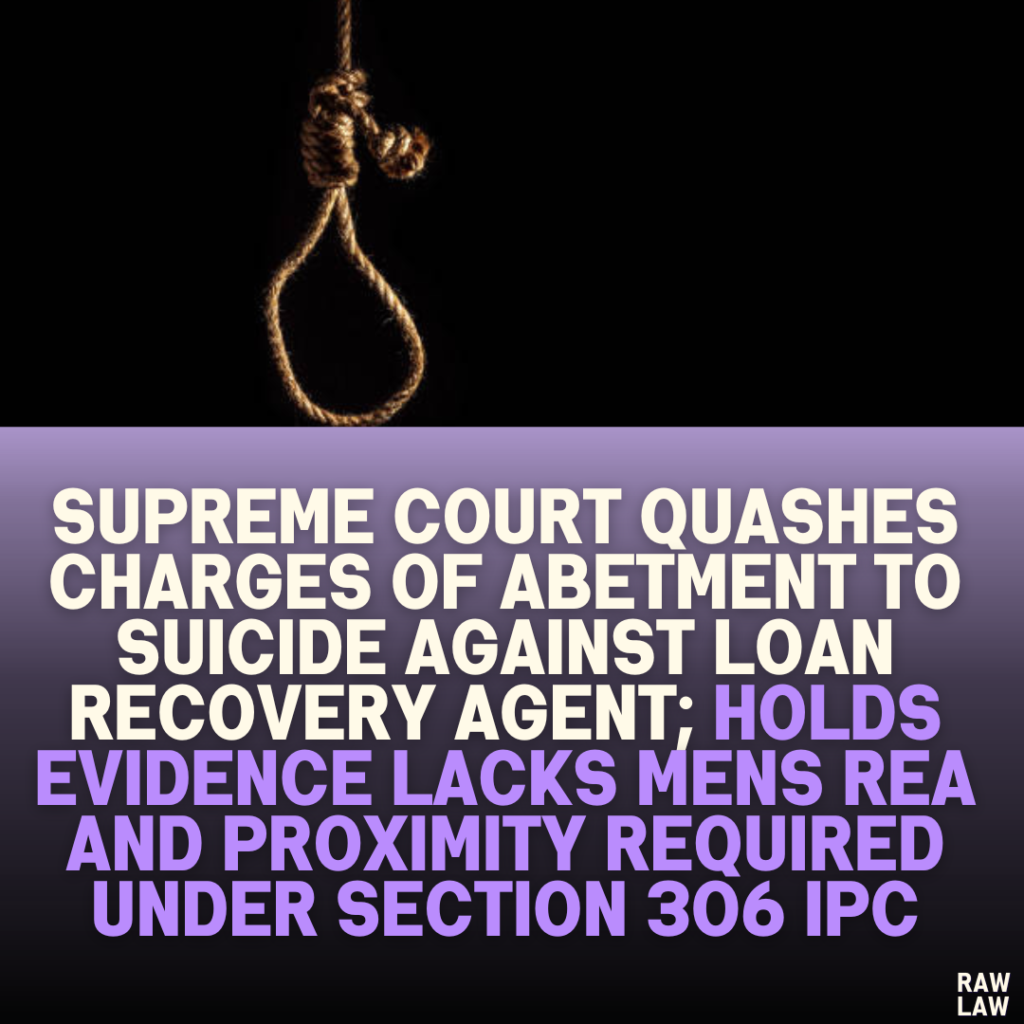Court’s Decision
The Supreme Court discharged the appellant, Mahendra Awase, from charges under Section 306 of the Indian Penal Code (IPC) related to abetment of suicide. It ruled that the evidence, including the suicide note and recorded conversations, did not establish the necessary ingredients for abetment. The Court quashed the proceedings in Sessions Case No. 19 of 2023 and reversed the High Court’s decision that upheld the trial court’s framing of charges.
Facts
- Incident Details:
- Ranjeet Singh, a guarantor for a loan taken by one Ritesh Malakar, committed suicide on October 11, 2022.
- His body was found hanging from a tree near Borgaon drain, close to his motorcycle.
- Evidence Found:
- A suicide note was discovered, stating that Ranjeet was harassed by the appellant for repayment of the loan.
- Witnesses confirmed the deceased had been mentally distressed for months due to harassment by the appellant.
- Audio recordings of conversations between the deceased and the appellant indicated coercive demands for repayment.
- Delay in Filing the FIR:
- The First Information Report (FIR) was filed on December 31, 2022, over two months after the suicide.
- Trial Court Proceedings:
- The trial court framed charges under Section 306 IPC, holding the appellant responsible for the mental distress leading to the deceased’s suicide.
- High Court Proceedings:
- The High Court upheld the trial court’s decision, rejecting the appellant’s request for discharge from the proceedings.
Issues
- Whether the appellant’s conduct constituted abetment to suicide under Section 306 IPC.
- Whether the evidence presented by the prosecution justified the framing of charges under Section 306 IPC.
Petitioner’s Arguments
- No Mens Rea:
- The appellant argued that he lacked the requisite intent to provoke the deceased to commit suicide.
- Professional Conduct:
- He stated that his actions were limited to recovering a loan on behalf of his employer, a cooperative society.
- Inadequate Evidence:
- The petitioner asserted that the evidence, including the suicide note and recordings, did not meet the legal threshold for abetment.
- Delay in FIR:
- The significant delay in filing the FIR cast doubt on the prosecution’s claims.
Respondent’s Arguments
- Harassment:
- The respondent contended that the appellant persistently harassed the deceased, causing mental distress.
- Suicide Note:
- The note explicitly mentioned the appellant’s role, implicating him in the deceased’s decision to end his life.
- Conversations:
- Recorded audio conversations revealed coercive and threatening behavior by the appellant, which the respondent argued constituted instigation.
Analysis of the Law
- Requirements under Section 306 IPC:
- Section 306 IPC penalizes abetment of suicide, defined as instigation, conspiracy, or intentional assistance in the commission of suicide.
- Abetment requires an active role by the accused in creating circumstances that compel the victim to commit suicide.
- Definition of Abetment under Section 107 IPC:
- Abetment includes instigation, engaging in a conspiracy, or intentionally aiding the commission of an act.
- Judicial Interpretation:
- The Court emphasized that mere harassment or heated exchanges do not constitute instigation unless they directly or indirectly compel the victim to take their life.
- Previous judgments, including Swamy Prahaladdas v. State of M.P. and Amalendu Pal v. State of West Bengal, establish that abetment requires clear evidence of intention to incite suicide.
Precedent Analysis
The Court referred to several key cases:
- Swamy Prahaladdas v. State of M.P.:
- Words spoken in anger or casual exchanges cannot amount to instigation.
- Madan Mohan Singh v. State of Gujarat:
- Abetment under Section 306 IPC requires specific intent to provoke suicide.
- Amalendu Pal v. State of West Bengal:
- Harassment without proximate cause or direct incitement is insufficient for abetment.
- M. Mohan v. State:
- Mens rea and active involvement by the accused are essential to sustain charges under Section 306 IPC.
Court’s Reasoning
- Absence of Mens Rea:
- The appellant’s actions were consistent with routine loan recovery practices and lacked the intent to provoke suicide.
- Heated Exchanges Insufficient:
- The recorded conversations, though harsh, did not amount to instigation or coercion as defined under Section 107 IPC.
- Delay in FIR:
- The two-month delay in filing the FIR undermined the credibility of the allegations.
- Misuse of Section 306 IPC:
- The Court expressed concern over the frequent misuse of Section 306 IPC, cautioning against its invocation in cases lacking substantial evidence of abetment.
Conclusion
The Supreme Court held that:
- The evidence presented by the prosecution did not satisfy the legal requirements for abetment under Section 306 IPC.
- The appellant’s conduct did not create circumstances compelling the deceased to commit suicide.
- The trial court’s framing of charges and the High Court’s decision to uphold them were both erroneous.
Implications
- High Evidentiary Bar:
- The judgment reinforces the stringent standards required to establish abetment under Section 306 IPC.
- Preventing Abuse of Process:
- The Court cautioned against casual and unfounded use of Section 306 IPC by investigative agencies.
- Judicial Scrutiny:
- The ruling underscores the importance of judicial oversight in ensuring fair trials and preventing misuse of criminal laws.




Pingback: Calcutta High Court Dismisses Recall Application: Reiterates Mandatory Filing of Certified Copies in Appeals and Emphasizes Temporary Relief Does Not Exempt Procedural Compliance - Raw Law
Pingback: Delhi High Court Vacates Injunction in Trademark Dispute: Cites Plaintiff’s Suppression of Material Facts and Prior Knowledge of Defendants’ Products, Disqualifying Equitable Relief - Raw Law